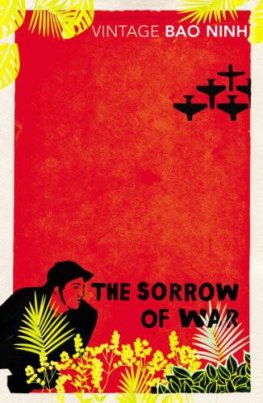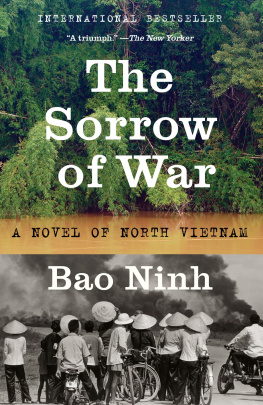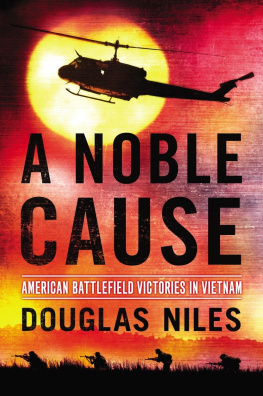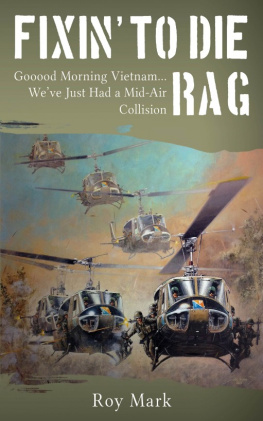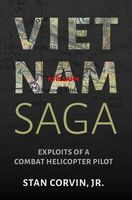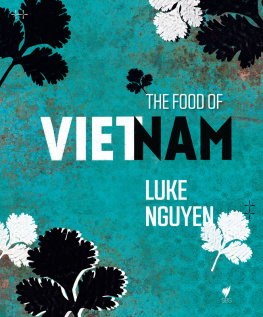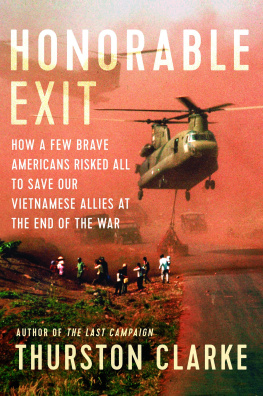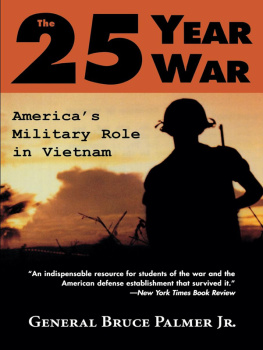Bo Ninh
THE SORROW OF WAR
A Novel
ENGLISH VERSION BY
Frank Palmos
FROM THE ORIGINAL TRANSLATION BY
Phan Thanh Hao

ON THE BANKS of the Ya Crong Poco River, on the northern flank of the B3 battlefield in the Central Highlands, the Missing In Action body-collecting team awaits the dry season of 1976.
The mountains and jungles are water-soaked and dull. Wet trees. Quiet jungles. All day and all night the water steams. A sea of greenish vapour over the jungles carpet of rotting leaves.
September and October drag by, then November passes, but still the weather is unpredictable and the night rains are relentless. Sunny days but rainy nights.
Even into early December, weeks after the end of the normal rainy season, the jungles this year are still as muddy as all hell. They are forgotten by peace, damaged or impassable, all the tracks disappearing, bit by bit, day by day, into the embrace of the coarse undergrowth and wild grasses.
Travelling in such conditions is brutally tough. To get from Crocodile Lake east of the Sa Thay River, across District 67 to the crossroads of Cross Hill on the west bank of the Poco River a mere fifty kilometres the powerful Russian truck has to lumber along all day. And still they fall short of their destination.
Not until after dusk does the MIA Zil truck reach the Jungle of Screaming Souls, where they park beside a wide creek clogged with rotting branches.
The driver stays in the cabin and goes straight to sleep. Kien climbs wearily into the rear of the truck to sleep alone in a hammock strung high from cab to tailgate. At midnight the rains start again, this time a smooth drizzle, falling silently.
The old tarpaulin covering the truck is torn, full of holes, letting the water drip, drip, drip through onto the plastic sheets covering the remains of soldiers laid out in rows below Kiens hammock.
The humid atmosphere condenses, its long moist, chilly fingers sliding in and around the hammock where Kien lies shivering, half-awake, half-asleep, as though drifting along on a stream. He is floating, sadly, endlessly, sometimes as if on a lorry driving silently, robot-like, somnambulantly through the lonely jungle tracks. The stream moans, a desperate complaint mixing with distant faint jungle sounds, like an echo from another world. The eerie sounds come from somewhere in a remote past, arriving softly like featherweight leaves falling on the grass of times long, long ago.
Kien knows the area well. It was here, at the end of the dry season of 1969, that his Battalion 27 was surrounded and almost totally wiped out. Ten men survived from the Unlucky Battalion, after fierce, horrible, barbarous fighting.
That was the dry season when the sun burned harshly, the wind blew fiercely, and the enemy sent napalm spraying through the jungle and a sea of fire enveloped them, spreading like the fires of hell. Troops in the fragmented companies tried to regroup, only to be blown out of their shelters again as they went mad, became disoriented and threw themselves into nets of bullets, dying in the flaming inferno. Above them the helicopters flew at tree-top height and shot them almost one by one, the blood spreading out, spraying from their backs, flowing like red mud.
The diamond-shaped grass clearing was piled high with bodies killed by helicopter gunships. Broken bodies, bodies blown apart, bodies vaporised.
No jungle grew again in this clearing. No grass. No plants.
Better to die than surrender my brothers! Better to die! the Battalion Commander yelled insanely; waving his pistol in front of Kien he blew his own brains out through his ear. Kien screamed soundlessly in his throat at the sight, as the Americans attacked with sub-machine-guns, sending bullets buzzing like deadly bees around him. Then Kien lowered his machine-gun, grasped his side and fell, rolling slowly down the bank of a shallow stream, hot blood trailing down the slope after him.
In the days that followed, crows and eagles darkened the sky. After the Americans withdrew, the rainy season came, flooding the jungle floor, turning the battlefield into a marsh whose surface water turned rust-coloured from the blood. Bloated human corpses, floating alongside the bodies of incinerated jungle animals, mixed with branches and trunks cut down by artillery, all drifting in a stinking marsh. When the flood receded everything dried in the heat of the sun into thick mud and stinking rotting meat. And down the bank and along the stream Kien dragged himself, bleeding from the mouth and from his body wound. The blood was cold and sticky, like blood from a corpse. Snakes and centipedes crawled over him, and he felt Deaths hand on him. After that battle no one mentioned Battalion 27 any more, though numerous souls of ghosts and devils were born in that deadly defeat. They were still loose, wandering in every corner and bush in the jungle, drifting along the stream, refusing to depart for the Other World.
From then on it was called the Jungle of Screaming Souls. Just hearing the name whispered was enough to send chills down the spine. Perhaps the screaming souls gathered together on special festival days as members of the Lost Battalion, lining up on the little diamond-shaped grass plot, checking their ranks and numbers. The sobbing whispers were heard deep in the jungle at night, the howls carried on the wind. Perhaps they really were the voices of the wandering souls of dead soldiers.
Kien was told that passing this area at night one could hear birds crying like human beings. They never flew, they only cried among the branches. And nowhere else in these Central Highlands could one find bamboo shoots of such a horrible colour, with infected weals like bleeding pieces of meat. As for the fireflies, they were huge. Some said theyd seen firefly lights rise before them as big as a steel helmet some said bigger than helmets.
Here, when it is dark, trees and plants moan in awful harmony. When the ghostly music begins it unhinges the soul and the entire wood looks the same no matter where you are standing. Not a place for the timid. Living here one could go mad or be frightened to death. Which was why in the rainy season of 1974, when the regiment was sent back to this area, Kien and his scout squad established an altar and prayed before it in secret, honouring and recalling the wandering souls from Battalion 27 still in the Jungle of Screaming Souls.
Sparkling incense sticks glowed night and day at the altar from that day forward.
There were civilian souls loose in the wood, too. Quite near to where the Zil truck parked on this rainy night there was once a tiny trail leading to Leprosy Village. Long ago, when Regiment 3 arrived, the village had been empty. Disease and successive famines had erased all life.
Still, it seemed the naked, warped and torn souls had continued to gather, emitting a stink that penetrated the imagination. The regiment sprayed petrol and set the village alight to cleanse it, but after the fire the soldiers were still terrified and none of them would go near the place again for fear of ghosts and lepers.
One day Lofty Thinh from Squad 1 courageously went into the village and there, in the ashes, shot a big orang-utan. He called in three others to help him drag it back to the squad huts. But, oh God, when it was killed and shaved the animal looked like a fat woman with ulcerous skin, the eyes, half-white, half-grey, still rolling. The entire squad was horrified and ran away screaming, leaving all their kit behind. No one in todays regiment ever believed the story, yet it was true. Kien and his colleagues had buried her, making a little headstone for the grave.

